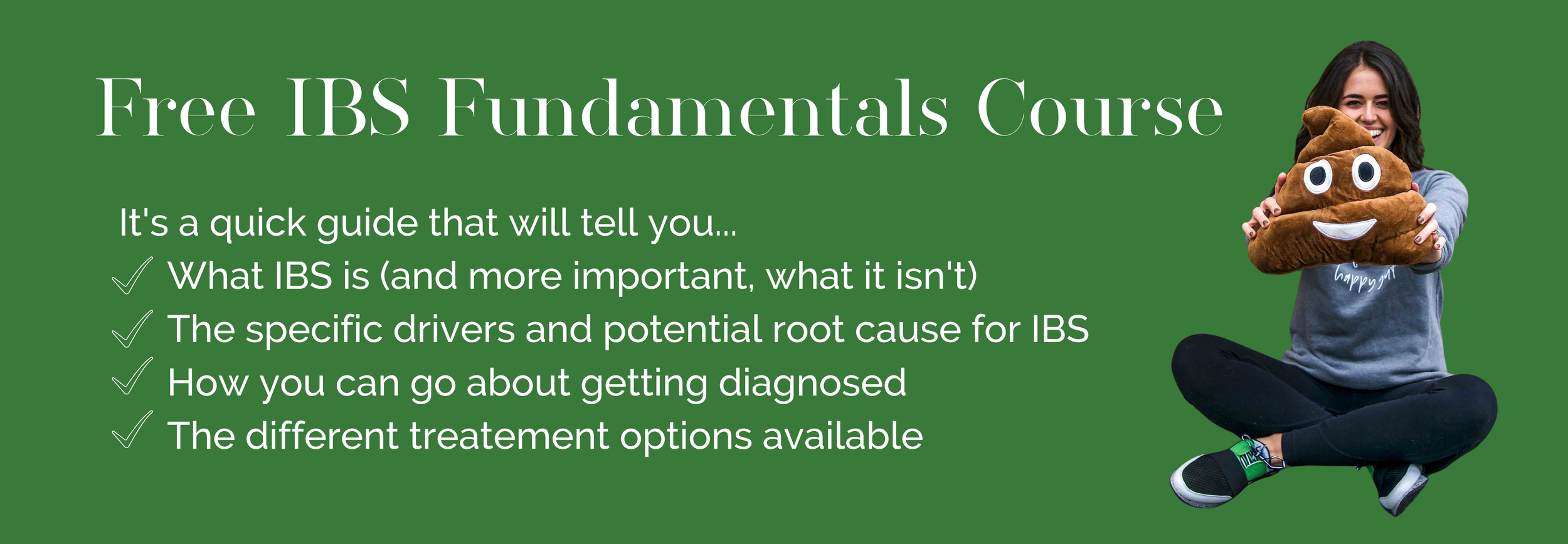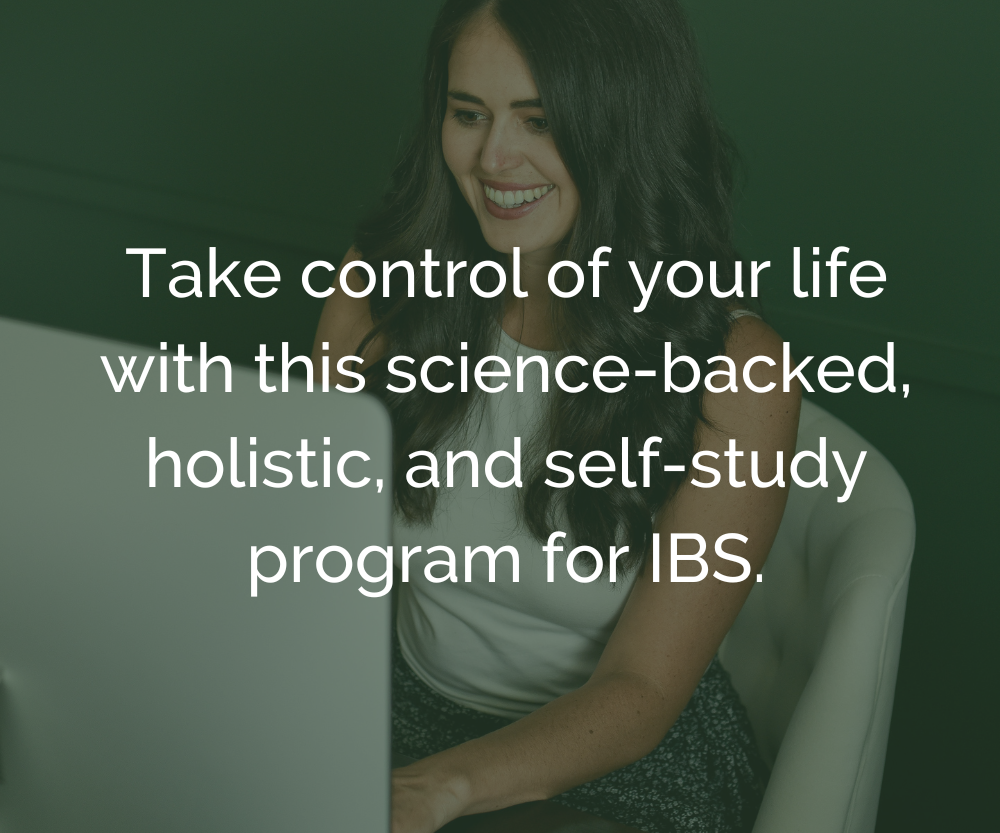The Effect of Sugar on Digestion & IBS
Sugar is not the most popular nutrient in the wellness world today. We know that a diet high in added sugars, typically seen in the Western diet paired with high-fat and low-fiber intake, increases risk for diabetes, heart disease, and a poor makeup of gut bacteria. While that is well-supported, there are many myths about sugar floating around that we need to talk about.
What is Sugar?
Let’s start with a basic understanding of what sugar actually is. The word “sugar” can refer to carbohydrates naturally found in many foods, sucrose that is added to foods, and alternative sweeteners that are either made synthetically or naturally occuring. The sugar glucose is our simplest carbohydrate molecule. When we digest and metabolize carbohydrates, our bodies break them down to glucose, which is then released into the bloodstream to be utilized by the body for energy, which we refer to as “blood sugar.” Glucose is known as the body’s energy source. Our body produces insulin to transport the glucose to our organs and cells, then discards what isn’t needed through the kidneys. When there’s consistently too much blood sugar, that’s where we begin to see insulin and glucose resistance, which is a marker of type 2 diabetes.
Table sugar is the molecule sucrose, made up of glucose and fructose. This is the most common form of “sugar” we talk about. Sucrose is added to foods and drinks to add sweetness. Since it is a smaller carbohydrate chain, it is broken down more quickly in the body, leading to a quicker release of glucose in the bloodstream, which means it can provide a quick source of energy but, in large doses, can also contribute to insulin and glucose resistance.
Naturally occurring “sugars,” including fructose found in many fruits and honey, are sometimes lumped in with sucrose in the sugar discussion. There is a debate about whether or not they’re “better” for insulin resistance. As of now, there’s no definitive case for them being “bad” or detrimental for health. Portion sizes may look different for those living with Type 1 or 2 diabetes, but there’s no need to completely eliminate them. The benefit of these sugars is that they are usually found in fiber-rich foods, like most of our fruits, which will help our beneficial gut bacteria thrive.
What’s your poop personality? Find out here!
Sugar’s Effect on the Gut
There’s a myth floating around that sugar feeds negative bacteria in the gut. I’ve made the mistake of making this statement in the past, but as I dug into research to find a “why” for this, I couldn’t find one. There’s no current scientific evidence that sugar feeds negative bacteria (if you find any, email it to me and let’s talk!). The truth is that all forms of sugar (sucrose, glucose, and fructose) are fully digested in the small intestine, where their smallest molecule gets absorbed into the bloodstream. They don’t actually travel to the large intestine (colon) where our microbiome is located. There is some theory that excess sugar intake can lead to molecules moving to the large intestine, but no definitive evidence, to date.
What we do see in research is that a Western diet marked by high-sugar, high-fat, and low-fiber intake is associated with a decrease in beneficial bacterial strains and an increase in negative bacterial strains. Yes, sugar is part of this, but there are no studies that have isolated sugar, in the absence of these other factors, to show the same change. Most likely, the reason for an unhealthy microbiome with the Western diet is tied to the lack of fiber.
Fiber is not absorbed in the body, which means it can pass through the small intestine to the large intestine. It is fermented by our gut bacteria and aids in digestion by adding bulk and creating a gel-like consistency to stool. Increased fiber intake is shown to increase both the quantity and diversity of beneficial microbes, thus contributing to a healthy microbiome.
Instead of saying sugar feeds negative bacteria, it would be better to say that a lack of fiber starves beneficial bacteria, creating an environment for negative bacteria to thrive. There’s most likely more going on that just that, so as we learn more about the microbiome and the function of different strains of bacteria we may have more clear explanations for these associations.
Sugar and Digestion
While sugar intake may not directly contribute to an altered microbiome, sugar intake could affect digestion and digestive symptoms, especially for those with irritable bowel syndrome (IBS). We usually label sugar as a gut irritant but, again, as I dug into research I didn’t find clear evidence for this.
Like I mentioned earlier, there are many different forms of sugar. Each form could impact digestion differently. Fructose is a FODMAP (fermentable oligosaccharides, disaccharides, monosaccharides, and polyols,) so it is a common IBS symptom trigger. For many, larger portions can speed up digestion, contributing to symptoms of pain, bloating, and diarrhea. For those without IBS, this could still be a concern. Polyols, which are naturally occuring sugars found in foods and synthetically made, are also FODMAPs and may have a similar effect as fructose.
Sucrose (aka table sugar) has the potential to speed up gut motility in larger quantities, leading to similar symptoms as fructose, but won’t be as common of a trigger. There is a new condition called congenital sucrase-isomaltase deficiency (CSID), known as sucrose intolerance. In this condition, there is an insufficient amount of the enzyme needed to break sucrose down in the large intestine. It’s not absorbed properly, so it can cause uncomfortable digestive symptoms, including pain, gas, constipation, diarrhea, and bloating. It can also lead to malabsorption, which can cause nutrient deficiencies and weight loss. The understanding of CSID is fairly new to the healthcare world, so it may be commonly misdiagnosed, especially in the IBS population. If someone is diagnosed with CSID, there’s no need to completely eliminate sugar, but enzyme supplementation will be necessary to avoid symptoms.
Alternative Sweeteners
When we learned that sugar played a role in negative health outcomes, our food industry began to boom with alternatives. These sweeteners are non-caloric, which means they aren’t absorbed in the body, and can either be synthetically made or naturally occuring. The idea was that we could replace table sugar with these options to still have sweet food products, without the negative effects.
We have since learned that many of these alternative sweeteners still lead to insulin resistance and glucose intolerance (our risk factor for diabetes,) some can actually negatively alter the microbiome, and some may be harmful to our overall health.
The two major alternative sweeteners that may lead to glucose intolerance and negative microbiome changes are saccharin (sold as Sweet and Low) and sucralose (sold as Splenda).
Two common natural sugar alternatives are stevia and glycyrrhizin. These are not currently shown to contribute to insulin resistance. In two different studies, stevia is shown to have both a negative and positive effect on the microbiome (more research is needed). Glycyrrhizin may have a positive effect on the microbiome.
Sugar alcohols, whether naturally occurring or synthetically made, may not alter the microbiome, but they can have a laxative effect, so they would not be ideal for those dealing with digestive disorders, like IBS.
To Eat Sugar or Not Eat Sugar?
The burning question everyone loves to ask: how much sugar should I eat?
The short answer is we don’t know. The longer answer is, it depends. Everyone’s nutrition needs are very different. Some people may be able to eat larger amounts of sugar than others, due to health history and current medical conditions. Deciding whether or not to choose sugar alternatives is also very personal. Stevia may be the better option, but there’s still a lot we have to learn about how these sweeteners affect our gut and overall health.
My personal philosophy is to not label foods as “good” or “bad.” Added sugars may not have a huge role in our overall health, like our colorful vegetables do, but they can still have a place for enjoyment and flavor. Eating sugar mindfully and intentionally by checking in with your body when you’re grabbing the sugar container or the snack can help you navigate when and how your body actually wants it. Yes, large amounts aren’t wonderful, but an unhealthy relationship with it won’t be helpful either. Whether you have IBS or not, it is beneficial to work with a dietitian to navigate this and find the best balance for your body.
Sources:
https://www.ncbi.nlm.nih.gov/pmc/articles/PMC6363527/
https://www.ncbi.nlm.nih.gov/pmc/articles/PMC5385025/
Are you frustrated with your IBS symptoms? Do you desire to be confident in your food choices? Do you want to have a healthier relationship with your body and diet? Are you ready to take control of your IBS?



